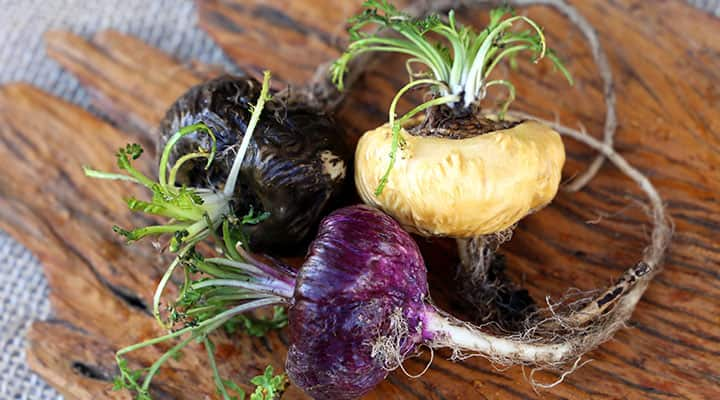
How to Naturally Enhance Libido
Published: March 2021
One of the most distressing side effects of the aging process is low libido. But we don't have to accept a loss of sexual desire, enjoyment and performance as a given. A lot of factors affect our sex drives…that means there are many opportunities for improvement.
Aging affects various parts of the body linked with sexual function. In men, this means more stimulation may be required to attain and maintain erections, and orgasms during sex may be less intense due to brain, hormonal and vascular factors.
In women, menopause contributes to a decline in sexual desire because of physical symptoms such as vaginal dryness, hot flashes and weight gain, which aren't exactly a recipe for an exciting evening!
While physicians often treat low libido with hormones, they don't always work. Are we missing something?
Libido — It really is all in your head

Treating low libido with hormones often falls short because it neglects one of the most important organs for a healthy sex life… your brain. A healthy libido — sexual desire and arousal — is controlled by brain chemicals called neurotransmitters.
The various functions of different neurotransmitters are complex. What we do know is that to improve your sex drive, you need balanced levels of many neurotransmitters, including the following:
- Dopamine
- Acetylcholine
- GABA
- Serotonin
Thankfully, there are some natural strategies that may boost these important brain chemicals and improve libido.
Restore sex drive with dopamine
It's well-known that dopamine affects sexual desire. Dopamine is the "feel-good" neurotransmitter involved in motivation—we want to do things when we feel good, after all.
The good news is that you may be able to improve your libido with the right combination of vitamins, minerals and natural ingredients. Here are a few suggestions that have the potential to help boost brain dopamine levels:
- Amino acids tyrosine and phenylalanine
- B vitamins, including folate and thiamine (B1)
- Chromium
- Rhodiola rosea
- Ginkgo biloba
Other compounds, such as wild green oat extract, may also support healthy dopamine levels.
Boost sexual arousal with acetylcholine
When it comes to the brain and libido, dopamine isn't the only game in town. The neurotransmitter acetylcholine is involved in arousal and maintaining erections. It's been suggested that people with low brain levels of acetylcholine are unable to concentrate on sex, hence disrupting the normal arousal process.
Therefore, to improve sexual arousal, you might consider the following natural acetylcholine boosters:
- Choline
- DMAE
- Acetyl-L-carnitine
- Phosphatidylserine
- Omega-3 fatty acids
Get in the mood with GABA
It may be difficult to reach orgasm if you are anxious or in a bad mood. If orgasms are eluding you for these reasons, the neurotransmitter that may help is GABA, which plays an important role in relaxation, controlling anxiety and having an all-around positive disposition.
You may be able to support your GABA levels and enhance your ability to climax with the following nutrients:
- GABA
- B vitamins, including B6
- Taurine
- White tea
- Kava kava
In addition to these nutrients, meditation and yoga may help; a relaxing massage and dim, romantic lights are also a good way to set the tone. While these intimate gestures don't guarantee a successful climax, they can help you relax and enjoy the moment. (Of course, you don't want to be so relaxed that you become sleepy!)
Improve intimacy with serotonin

Serotonin is often referred to as our "happiness" neurotransmitter. Serotonin metabolism imbalances in the brain can result in a lack of joy and decreased feelings of intimacy. And without intimacy, sex can lose some of its appeal.
Optimizing brain serotonin function and levels may be a helpful way to address this concern. Here are some nutrients that may help:
- Tryptophan
- Saffron extract
- Omega-3 fatty acids
- Magnesium
- 5-HTP
Be aware that boosting serotonin too much may have the opposite effect and actually decrease libido (which is why this is a common side effect of some antidepressants). That being said, increasing happiness and intimacy doesn't only enhance your sex life — it pays off in other areas of life as well. Building intimacy outside the bedroom can do wonders for improving relationships and emotional well-being.
Enjoy the benefits
Not only is sex a fun way to boost intimacy and connection, but healthy sexual function is beneficial for overall well-being and longevity. And contrary to what many people think, it is possible to maintain youthful sexuality well into your golden years.
By using targeted nutrients to balance and optimize the chemicals in your brain, you can be well on your way to enjoying a healthy libido today.
References
- Brain Behav. 2019;9(12):e01389.
- J Endocrinol Invest. 2003;26(3 Suppl):20-2.
- ACS Chem Neurosci. 2015;6(1):16-26.
- Acta Paediatr Suppl. 1994;407:86-8.
- BMC Neurosci. 2018;19(1):71.
- J Clin Psychiatry. 2009;70 Suppl 5:12-7.
- Med Hypotheses. 2015;85(1):45-8.
- Front Pharmacol. 2019;10:1433.
- Food Funct. 2019;10(12):8161-8171.
- J Altern Complement Med. 2011;17(7):635-7.
- Cell Rep. 2017;18(4):905-917.
- Nutrition reviews. 2009;67(11):615-623.
- Am J Clin Dermatol. 2005;6(1):39-47.
- Neurochem Res. 1990;15(6):597-601.
- Neurobiology of Aging. 1987;8(5):403-407.
- The Journal of Nutrition. 2002;132(9):2506-2513.
- Neuroscientist. 2002;8(6):562-73.
- J Inherit Metab Dis. 2019;42(4):629-646.
- Life Sci. 2019;231:116584.
- J Sci Food Agric. 2017;97(14):4679-4689.
- PLOS ONE. 2016;11(6):e0157700.
- Eur J Pharmacol. 2018;836:129-135.
- Psychopharmacology (Berl). 2012;223(4):381-8.
- Neurosci Lett. 2012;528(1):27-30.
- Faseb j. 2015;29(6):2207-22.
- J Neural Transm (Vienna). 2012;119(5):575-9.
- Altern Med Rev. 1998;3(4):271-80.



